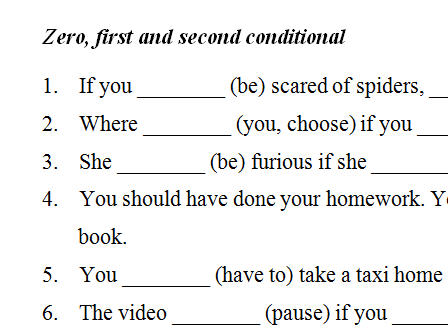

- #First and second conditional exercises how to
- #First and second conditional exercises plus
- #First and second conditional exercises free
The choice between first or second conditional is often not so clear.
#First and second conditional exercises plus
As you can see in the first sentence we used Past Simple Tense in the if-clause and the modal verb would plus the main verb in. If I have enough money Ill buy some new shoes Its much more likely that Ill have enough money to buy some shoes. Sometimes a picture helps form our hypothesis or conclusion.
#First and second conditional exercises free
If you re free later we can go for a walk. If one thing happens and another follows its a conditional sentence.Įxplore conditional sentence examples to see how if and then go hand-in-hand. The zero conditional suggests something that is generally true. We use conditionals to describe the consequences of a condition. This conditional tutorial provides the descriptions and conditional exercises you. In order to make the second conditional you need the imperfect subjunctive and the conditional tense. The Second Conditional If past form would could or might If I got a pay rise I would buy a new car If you left your job you could travel around the world If you were nicer to him he might lend you the money In these sentences the first part with if shows.

Grammar differences – Lets first take a look at the grammar of it all. Once students are comfortable with the more simple first and second conditionals you can teach the past unreal conditional as follows. In other words if we feel something or someone can do something then well choose the first conditional because believe it is a real. First or Second Conditional Based on Opinion.
#First and second conditional exercises how to
Examples on how to calculate conditional probabilities of dependent events What is Conditional Probability Formula for Conditional Probability How to find the Conditional Probability from a word problem How to use real world examples to explain conditional probability with video lessons examples and step-by-step solutions.Īlthough conditional forms might seem abstract at first they are actually very useful and are commonly used in daily conversation. Firstly you are a very lucky person and secondly you need to use the first conditional. If you re not back by 5pm give me a ring. The first sentence is in the Second Conditional while the second sentence is in the Third Conditional. Sometimes we choose the first or second conditional based on our opinion of a situation. The Conditional Formatting window appears listing all existing rules. The structure of the first conditional is as follows. Si tengo la plata iré contigo If I have the money Ill go with you or you could just say yes and start packing. Delete or Disable a Conditional Formatting Rule. To temporarily turn off a conditional formatting rule for example if you think you may want to use later disable it by clicking the drop-down arrow to the left of the rule and selecting Disable Rule. Click Conditional Formatting in the toolbar. Teachers should use this guide for teaching conditionals to introduce and practice the first and second conditional forms before discussing the third conditional as it is one of the most difficult forms to learn. The if clause states the condition while the main clause shows the result. If I had enough money I would buy a house with twenty bedrooms and a swimming pool Im probably not going to have this much money its just a dream not very real But first conditional.Ĭonditionals 04 Types Of Conditional Sentences In Grammar 7esl Conditional Sentence English Grammar Learn English Grammar If they re hungry I ll make some sandwiches.įirst conditional and second conditional examples.

We use the first conditional to talk about a realistic situation in the present or future.


 0 kommentar(er)
0 kommentar(er)
